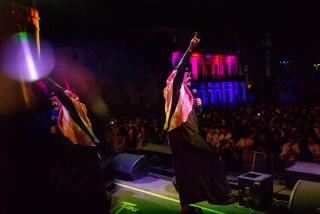Public Craves Another Kind of Power
- Share via
BAGHDAD — Judging solely by the number of words each spent on it, the installation of the new Iraqi leadership council here Sunday was a much bigger deal to the people in the interim government than it was to the people they represent, or at least that tiny portion who passed the afternoon of the great event at Cafe Al Zahawii.
Some of the day’s affairs were broadcast live on pan-Arab satellite television networks, but the local stations ignored it and played soap operas. At the Al Zahawii, a century-old haunt of poets, artists and other assorted loafers on Rashid Street downtown, there was nothing in the air but water-pipe smoke.
The place was full of men. The TV was turned off, replaced by the click and clack of dominoes and backgammon stones.
The general consensus at one table was that all things considered, the new council is fine and having one is better than not, but that in the summer, it is a different sort of power that soothes a man’s soul. “A man becomes quiet with electricity in the summertime,” Ali Hussein said.
Which was another way of saying that the interim government had been in place for, what, five minutes? And air conditioning, jobs and a sense of safety all remained in short supply.
“Our first priority is security. Improving the situation of the Iraqi people is second. They must take care of the civil servants and the unemployed,” Hussein said.
The men around the table nodded in agreement, which was curious seeing as most of them are being taken care of very well. Two were cops who are being paid not to work, and Hussein himself is an elementary school principal who is not only being paid not to work but has just received a raise from $15 to $120 a month.
One reason the cafe was full in midafternoon was that most of the men in it were being paid and not working.
Magid Ali, an auto mechanic, was the sole exception at his table. He was working every day and not getting paid. He said he didn’t pay much attention to the new council because he knew it was a temporary step.
“It depends on who they choose to rule,” he said.
The men were all middle-aged or older and not as eager as many of their younger countrymen to see the Americans leave.
“They should stay as long as they want. Even if they stay 20 years, so long as we have security,” said Jabbar Bachat, who said that he was coming out of retirement to take one of those new police jobs that pay so well and require so little.
There was a little more enthusiasm for the new 25-member council, especially for its inclusion of three women, across town on a busy shopping street in Adamiyah, one of the few neighborhoods in this harsh city that could be described as charming. The sidewalks were filled with women and their children.
Hiba Katham said she hoped this would hasten the exit of the Americans. “It’s bad for them to stay,” she said. “They get hurt. We get hurt.”
Zeena Mushtak called it one of the best days in Iraqi history. “Saddam didn’t give women an opportunity at all,” she said.
Mushtak earned an economics degree but was unable to continue on to graduate school -- something she blames on the Hussein regime.
“Now this,” she said, “is a great chance for Iraq. It is the very first time in Iraqi history that women can participate. We hope even more women will participate -- more than three. We want a woman governor. There is no more Saddam. We can do everything.”
More to Read
Sign up for Essential California
The most important California stories and recommendations in your inbox every morning.
You may occasionally receive promotional content from the Los Angeles Times.













